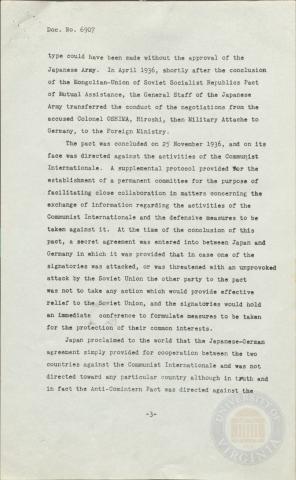
Page 3
| Parent | Doc. 6907 - Collaboration Between Japan, Germany and Italy, Volume 1 - Opening Statement |
|---|---|
| Date | |
| Language | English |
| Collection | Tavenner Papers & IMTFE Official Records |
| Box | Box 15 |
| Folder | Japan, Germany, Italy Collaboration Vol 1 |
| Repository | University of Virginia Law Library |
Doc. No. 6907
type could have been made without the approval of the Japanese Army. In April 193&* shortly after the conclusion of the Mongolian-Union of Soviet Socialist Republics Pact of Mutual Assistance, the General Staff of the Japanese Army transferred the conduct of the negotiations from the accused Colonel OSHIMA, Hiroshi, then Military Attache to Germany, to the Foreign Ministry.
The pact was concluded on 25 November 193^> and on its face was directed against the activities of the Communist Internationale. A supplemental protocol provided for the establishment of a permanent committee for the purpose of facilitating close collaboration in matters concerning the exchange of information regarding the activities of the Communist Internationale and the defensive measures to be taken against it. At the time of the conclusion of this pact, a secret agreement was entered into between Japan and Germany in which it was provided that in case one of the signatories was attacked, or was threatened with an unprovoked attack by the Soviet Union the other party to the pact was not to take any action which would provide effective relief to the Soviet Union, and the signatories would hold an immediate conference to formulate measures to be taken for the protection of their common interests.
Japan proclaimed to the world that the Japanese-German agreement simply provided for cooperation between the two countries against the Communist Internationale and was not directed toward any particular country although in tjrtith and in fact the Anti-Comintern Pact was directed against the
